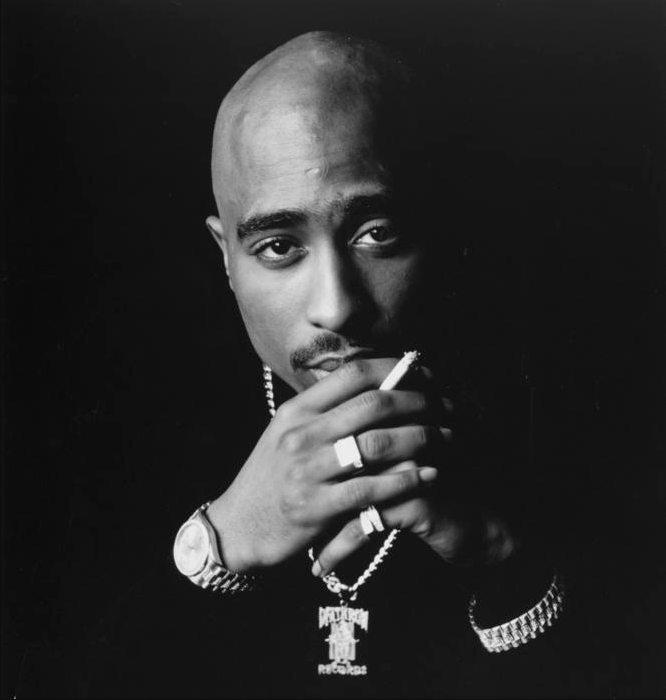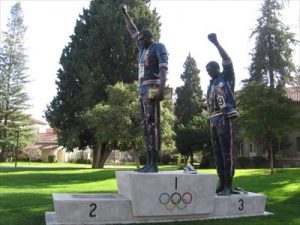Tupac Shakur, a rapper in the 1990s, was known as a legend in the hip-hop and R&B industry for creating impactful music that told a story.1 Every single song he wrote was focused on social and cultural issues, such as gang violence, drugs, childhood struggles, and loss of loved ones, which is why he was successful from the beginning of his music career. Although he was successful, he had a lot of challenges that came with his lifestyle, including run-ins with the law for battery and sexual assault. He had a code that he honored so much that he even had it tattooed across his pelvis: “Thug Life.” This code, along with the hard life he lived, didn’t bring much ease to his situation with the law.2 Although Tupac had his troubles, his music was his escape and his motivation to overcome the obstacles that were set for him.
The first album Tupac released on his own was 2 Pacalypse Now in November of 1991.3 It was a hit from the start, reaching the top of the Billboard charts, and it didn’t take long for it to go gold, making this album his first solo debut as a rapper. He knew what he wanted and he was going to get to the top no matter what. In an interview with Vibe, he stated, “I never went to bed. I was working it like a job. That was my number one thing when I first got in the business. Everybody’s gonna know me.”4 However, with the start of his stardom and fame in music began the start of his journey living the “Thug Life.” He was constantly asked why he chose that lifestyle and why he chose to be a “thug.” His response was, “Because if I don’t, I’ll lose everything I have. Who else is going to love me but the thugs?”5

His music and his lifestyle attracted a lot of attention: good attention as well as bad. The good attention focused on the stories that were told by his music, stories that people could relate to as well as stories that other people couldn’t bring themselves to talk about. The bad attention came from authority figures who thought his music was undermining them and promoting violence among young adults listening to his music. One song that was criticized was “Brenda’s Got a Baby,” which listeners and authority figures thought contained too many explicit lyrics, overshadowing listeners’ judgment and interpretation of the song. In fact, the song was based on a newspaper article about a man who impregnated his cousin Brenda, whose name appears in the title of the song. She was only twelve years old and she tried to get rid of the baby girl by throwing her in a trash can. The song raised objections from the public because of the way it seemed to condone and praise the actions of Brenda.6 Most of Tupac’s songs were inspired by incidents in his life that turned into musical hits. This is how talented he was. He used his own struggles and the struggles of other people, turning them into songs that people could relate to.
Sadly, several days after Tupac released his second album Strictly 4 My N.I.G.G.A.Z in 1993, he was arrested on a sexual assault charge of a teenage girl in New York.7 The young girl was attacked in the Manhattan hotel where Tupac was staying. The girl that he allegedly raped had been previously in a romantic relationship with Tupac. She accused Tupac and three of his friends of abuse, and this was his first major run-in with the law. Most of the charges were dropped, except for the sexual assault charge. He was released on bond and later sentenced to a year and a half to four years in prison. Tupac served his sentence in New York’s Riker’s Island Penitentiary.8
Some people believed that this would be the last they would see or hear of Tupac. Little did they know that this would be his moment to shine. While incarcerated, Tupac decided to put his “Thug Life” behind him by saying, “If Thug Life is real, then let somebody else represent it because I’m tired of it. I represented it too much.”9 This turning point in his life wasn’t the only good thing that happened to Tupac while he was locked up. During this time, his third album, Me Against the World, which was released in 1995, started moving up the charts and ended up at number one. This album wasn’t like the others; it captured a new side of Tupac, portraying his poetic side, and showing the compassion and gratitude he had towards life.10 Not only was the album a hit, but his song “Dear Mama” reached top ten on the singles charts.11 The song was dedicated to his mother, Afeni Shakur. It was a very touching song that told the story of how Tupac grew up, as well as the sacrifices his mother made for him in the absence of his father. He also talked about how he turned to the streets, to drugs, and to violence to fill the void left behind by the absence of his father.12

After Tupac served eight months of his sentence, Suge Knight from Death Row Records paid a $1.4 million dollar bond to have Tupac released from prison. As soon as he was released, he was flown to Los Angeles to sign a contract with Death Row Records.13 However, signing with Death Row made his vow to change his lifestyle difficult for him. He was caught in the feud between the East Coast and the West Coast. This feud was mainly between the record labels Death Row and Bad Boys. The feud contained a lot of taunting and talking bad about each other through songs. It was their way of proving which record label was better at the time. They used personal vendettas to get to one another through song by exploiting personal facts about each other’s lives. There was a lot of going back and forth, as well as the occasional scuffles they’d get into when they would see each other in person.14
After signing with Death Row Records, Tupac released his first double album, All Eyes on Me, in 1996. It didn’t take long for the album to go platinum. This album came with another big hit song, “California Love.” Another hit from the album was “How Do You Want It,” which also reached number one in pop and R&B charts. This album talked about the time he spent incarcerated, his feud with the East Coast, and his love-hate relationship with women.15

Between signing with Death Row Records and the feud going on with the East Coast and West Coast, Tupac started to show his dissatisfaction with the hip-hop and R&B industry. He began to realize that his music career was his downfall, that it was where his troubles all started.16 On September 7, 1996, Tupac Shakur was shot after leaving the Mike Tyson vs. Bruce Seldon fight at the MGM Grand Hotel in Las Vegas. He remained alive for a week before his condition worsened, and he passed away on September 13, 1996.17 With his death he became even more famous. Death Row released the album he was currently working on at the time of his death, proving that Tupac’s legacy would still go on through his music even though his life was over.18 To this day, Tupac is still one of the most influential rappers who has ever lived. His music was much more than just rap. It was, and continues to be, the story of his life, which was a life that influenced people around the world and gave people music that they could relate to.19
- Baker’s Biographical Dictionary of Popular Musicians Since 1990, 2004, s.v. “2pac,” by Shawn Gillen. ↵
- St. James Encyclopedia of Popular Culture, 2013, s.v. “Shakur Tupac (1971-1996),” by Pierre-Damien Mvuyekure. ↵
- The Scribner Encyclopedia of American Lives, 2001, s.v. “Shakur, Tupac Amaru,” by Louise Continelli. ↵
- Contemporary Black Biography, 1997, s.v. “Shakur, Tupac 1971-1996,” by Simon Glickman. ↵
- The Scribner Encyclopedia of American Lives, 2001, s.v. “Shakur, Tupac Amaru,” by Louise Continelli. ↵
- Encyclopedia of African American History, 2010, s.v. “Shakur, Tupac,” by Aaron D. Sachs. ↵
- The Scribner Encyclopedia of American Lives, 2001, s.v. “Shakur, Tupac Amaru,” by Louise Continelli. ↵
- Contemporary Black Biography, 1997, s.v. “Shakur, Tupac 1971-1996,” by Simon Glickman. ↵
- The Scribner Encyclopedia of American Lives, 2001, s.v. “Shakur, Tupac Amaru,” by Louise Continelli. ↵
- Baker’s Biographical Dictionary of Popular Musicians Since 1990, 2004, s.v. “2pac,” by Shawn Gillen. ↵
- Contemporary Black Biography, 1997, s.v. “Shakur, Tupac 1971-1996,” by Simon Glickman. ↵
- St. James Encyclopedia of Popular Culture, 2013, s.v. “Shakur Tupac (1971-1996),” by Pierre-Damien Mvuyekure. ↵
- The Scribner Encyclopedia of American Lives, 2001, s.v. “Shakur, Tupac Amaru,” by Louise Continelli. ↵
- St. James Encyclopedia of Popular Culture, 2013, s.v. “Shakur Tupac (1971-1996),” by Pierre-Damien Mvuyekure. ↵
- Baker’s Biographical Dictionary of Popular Musicians Since 1990, 2004, s.v. “2pac,” by Shawn Gillen. ↵
- Encyclopedia of African American History, 2010, s.v. “Shakur, Tupac,” by Aaron D. Sachs. ↵
- Baker’s Biographical Dictionary of Popular Musicians Since 1990, 2004, s.v. “2pac,” by Shawn Gillen. ↵
- The Scribner Encyclopedia of American Lives, 2001, s.v. “Shakur, Tupac Amaru,” by Louise Continelli. ↵
- Angela Ardis, Inside A Thug’s Heart (Kensington: Kensington Publishing Corporations, 2004), 207-208. ↵



88 comments
Sophia Rodriguez
I grew up listening to Tupac and other rappers he worked with also. I could not help but also think about the movie “All Eyez on Me”. I loved watching the movie about him and reading it from your article also. I always thought Tupac’s music was always relevant to what was going on in his time period. As a fan of Tupac his song “Dear Mama” and “California Love” were some of my favorites he wrote.
Diego Oviedo
Tupac Shakur where to even start. Growing up listening to Tupac he was the one who really opened the eyes of the public to the social injustices occurring in the neighborhoods and honestly all over the United States. With every song that he created you were able to visualize the struggle and connect to it in some way if you lived something similar to the hardships the people created. It’s interesting you know how even though Tupac would speak the truth and wouldn’t hold back, the people who had power and authority were always the ones trying to undermine him and create problems for him because they felt disrespected by the truth. The whole ordeal with Death Row and Suge was an interesting one, aside from reading this article if you know your stuff then you know it was crazy and very dangerous times. When Pac died it was very saddening however in his music you can hear his story. Many of his songs you can play and it will bring people together but one main one would be Keep Ya Head Up, and all I can say is actually listen to it and feel the words in your heart.
Lucia Saks
I have always found Tupac super interesting. The conspiracies that surround his death and who was the one who shot him is one of the biggest conspiracies that we are able to see. The down side of this is that his life isn’t really talked about as much now in the times after his death. This article highlighted his life and why he was a really big influence on rap and how his lyrics provoked many listeners. This article highlights the struggle he went through and the reason that he wrote the music he did and why he felt like he needed to discuss the unique experience he lived through in order to give a voice to people in similar situations. The fact that he also tried to turn his life around but struggled immensely also makes his life so much more interesting and his story so powerful.
David Castaneda Picon
This is a great article, I don’t know much about Tupac and B.I.G but I am trying to learn more about them since I’ve heard their music had a huge impact on the American culture making them hip-hop musical legends. It is very interesting how their friendship was such an important thing not just for them but for the community to the point that they made a rivalry between the East Coast and West Coast.
Bruno Lezama
I have heard Tupac’s music because of my friends; however, I have to admit that I am not a big fan of him. After reading this article, I know that Tupac had a lot of struggles in his life. However, He knew how to put these struggles and other people’s struggles into his music, something that made Tupac’s music very popular. His music changed the music industry and how we see society. Great Article!
Thalia Romo
Growing up I knew of Tupac due to my father listening to his music daily and being highly interested. As I grew older, I became more aware of how Tupac passed away. However, I enjoyed reading this article because it was able to speak of his past, which I didn’t know much about. I enjoyed learning about Tupac’s underlying meanings behind his songs and song titles.
Eliezer Leal
I have only recently started to listen to Tupac’s music, and from the little time that I have listened I can tell his experiences weren’t always easy. The first song I heard from him was “Dear mama”, and in this song he acknowledges that his incarceration caused his mother pain because no mom wants to see their child in jail. I do plan to continue to listen to Tupac and hopefully I can better understand his story like many of his fans.
Octaviano Ibarra
Tupac’s life was a very interesting one. With his background of having an activist mother who dabbled in drugs still raised Tupac for the better morally, was sure that he would keep up his intelligence and stay out of trouble. Even including the fact he had no father and his mother had to fill in as best as she could we both positions. Many people when speaking of Tupac and his music only speak of his music that talks about struggles, how racism is, and so on. Not enough like to admit or bring up that Tupac has had songs about women and sex. It might not be many but it is still something to acknowledge since it is apart of his music. Not to say that makes him a bad man or bad person but it is something to also be known.
Addie Piatz
I have heard a lot of mixed emotions about Tupac over the years. Recently I watched the movie “The Hate You Give” and it really helped give me have my own opinion about him. I think he was one of the few artists that wanted to use his fame to really try and make a diffeence. I love how influential his music was but for the better. He told stories with his music and wrote about things that made people uncomfortable but they were things they needed to be said and talked about.
Vania Gonzalez
Tupac is probably one of the greatest artist out there in my opinion because of how real he was with his music. He exposed how life really was and not everyone could handle it that is why it was a tough road for him with the law. In the end Tupac talked about the most important things like in his song ” Keep Ya Head Up” it was mostly about the way women are treated today in a patriarchal society when women are the most important part of reproduction. Tupac will always be one of the greats, great article I love that you did an article on him and his story.